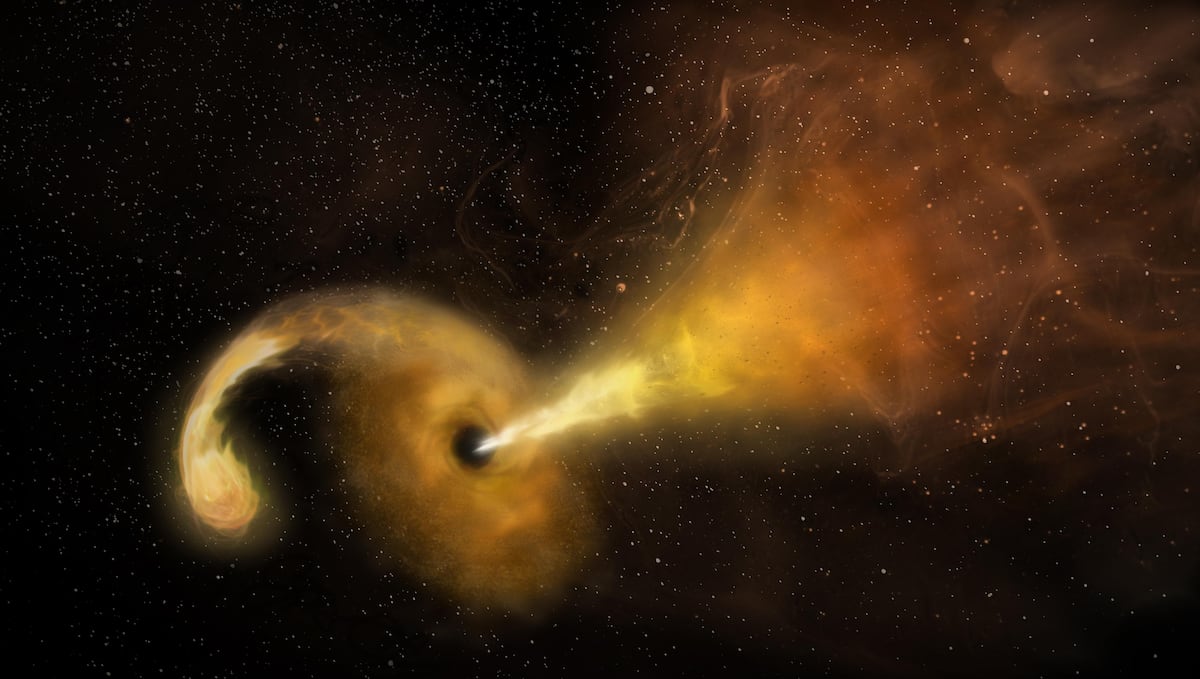If one of two entangled particles falls into a black hole, what will happen to the other? | Scientists answer | The science

Answering the question in the title is quite difficult because the problem is that we currently do not have a generally accepted theory that reconciles quantum mechanics with the theory of gravity. On the one hand, we know how classical objects behave when they are exposed to large masses, as is the case with a black hole. For example, our Milky Way galaxy orbits what we assume is a black hole; and although we do not see it, we know what happens to objects near it.
On the other hand, we know what happens to an atom when we look at it closely with quantum mechanical eyes. Moreover, within the quantum world, particles can be entangled, much to the dismay of Albert Einstein, who did not believe in this unique property. Entanglement is so foreign to our classical mind that if I have two entangled particles and in one of them I measure a characteristic (for example, its angular momentum), automatically, even if the other is at the other end of the Universe, I know where it is going (i.e. what angular momentum it will have) because it is entanglement. Entanglement means that if we have a particle with some characteristic and it is entangled with another, then this other automatically acquires a certain value of this property, dictated by the first. We could say that two particles are talking to each other, even if they are not locally in the same place.
To find out, we need to carry out experiments in which we measure a characteristic of the first of two particles, and then we need to measure the same characteristic of particle number two and confirm that its state matches our expectations, since they are entangled. To carry out this experiment there must be a channel in which we check that the two particles are entangled. And this channel is classic.
Let me give you an example: imagine that you have a particle Alice and a particle Bob. Alice goes to Madrid, and Bob goes to Barcelona. And imagine that we measure color: if Alice measures blue, Bob measures green, and if Alice measures green, Bob automatically measures blue, because they are intertwined. But all we know is that after Alice measures, we also ask Bob and check that whenever Alice measures green, Bob measures blue. For this test we needed a classic communication channel. Usually this classical channel is considered to be one in which space-time follows the Euclidean metric, or, more simply, the one to which we are accustomed. But in a black hole, space-time is deformed due to the enormous mass, and we have to resort to the general theory of relativity formulated by Albert Einstein.
Now let’s move on to answering the question. What happens in a black hole to the information that passes through it is unknown, it is even believed that the information is largely destroyed (although some of it escapes and is known as Hawking radiation). Therefore, this would mean that we would not be able to recognize the two colors of Alice and Bob. So what happens to a particle entangled with another particle falling into a black hole would be nothing. I think that we will not be able to know whether they are intertwined or not inside this black hole, since we need a channel through which information is transmitted, and in a black hole, information does not flow, so we will not be able to communicate with them.
Rosa Lopez Gonzalo She is a professor and researcher at Institute of Interdisciplinary Physics and Complex Systems (IFISC) of the University of the Balearic Islands, his research area is quantum transport.
Question sent by email from Hector Diaz Prato.
Coordination and writing: Victoria Toro.
We answer this is a weekly scientific consultation sponsored by the program L’Oréal-Unesco “For Women in Science”, which answers readers’ questions about science and technology. These are scientists and technologists, partners MY T (Association of Women Researchers and Technologists), those who answer these questions. Send your questions to werespondemos@gmail.com or X #werespond.
You can follow ITEM V Facebook, X And instagramor register here to receive our weekly newsletter.
